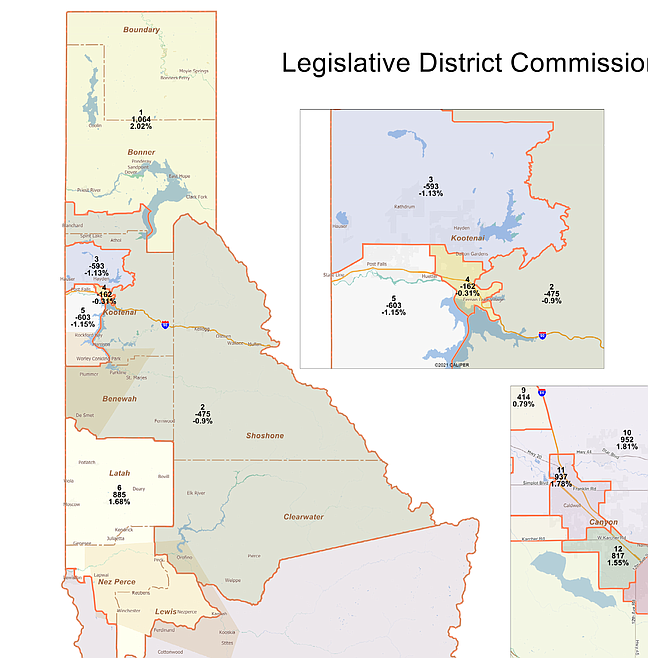CDA Tribe challenges redistricting
▶️ Listen to this article now.
A legal challenge filed with the Idaho Supreme Court by the Coeur d'Alene Tribe and Shoshone-Bannock Tribes marks the fourth lawsuit against the state's 2021 redistricting map.
States redefine legislative and congressional districts every decade to equalize political representation based on U.S. Census Bureau population data. Redistricting is a required process under the U.S. and Idaho constitutions.
In early November, the state's bipartisan commission approved a new map, titled L03, that revised Idaho's 35 legislative districts.
Since then, four challenges have been filed against L03.
The tribes' lawsuit contends the L03 "ignore(ed) their requests, splits important communities of interest and violates the Idaho Constitution."
"It's not any secret that both the Shoshone-Bannock Tribes and the Coeur d'Alene Tribe were disappointed in the outcome of the commission's work," Tribe Legislative Director Tyrel Stevenson said on Monday. "Both tribes were vocal about the final map and publicly pleaded with the commission not to do what they were doing in L03."
During a September visit with the redistricting commission in Plummer, Coeur d'Alene Tribal Chairman Chief Allan urged members to maintain the Coeur d'Alene Reservation district boundaries.
Stevenson also spoke to The Press about the Tribe's concerns regarding the new legislative map in a story on Nov. 10.
"This district does not consider the tribal community or any community of interest for that matter," Allan said. "Our communities all deserve responsive, local representation by citizens who are familiar with the needs of their constituents and who are accessible to their constituents."
During the November interview with The Press, Stevenson predicted that L03 was "ripe for a challenge" - and he was correct.
Redistricting commissioners redraw legislative and congressional boundaries according to state and federal requirements. Some basic principles are:
I.C. 72-1506(2), "districts shall preserve traditional neighborhoods and local communities of interest"
I.C. 72-1506(3), "districts shall be substantially equal in population"
I.C. 72-1506(4), "avoid drawing districts that are oddly shaped"
I.C. 72-1506(5), "Division of counties shall be avoided whenever possible"
Copies of the tribes' challenge available on the Idaho Supreme Court website state that the commission "wholly failed to consider retaining the tribes' sovereign interests" and "fractured their reservations" through the redistricting process.
Stevenson said much of the Coeur d'Alene Tribe's worry is that their new district, District 2, would negatively affect the reservation's representation at the state level.
"Representation is critical," he said. "Good representation comes from people who understand the community they serve and come from the community they serve, even if they are only there for a short time."
The Coeur d'Alene Reservation is currently represented by District 3 and 5.
Under the L03 map, the Coeur d'Alene Reservation would be represented by the redefined District 2. Based on graphics available on the state's website, District 2 would include residents in:
The eastern half of Kootenai County
Those on the Kootenai-Bonner border
Shoshone, Clearwater and Benewah counties
The only sitting legislator within District 2 boundary lines would be Rep. Heather Scott, R-Blanchard.
"When you have a district that spans five different counties and takes five hours to drive from one end to another, it changes representation," Stevenson said. "That isn't fair to the community, especially when the tribe is so unique."
Similarly, the Shoshone-Bannock Tribes were concerned that L03 divided the Fort Hall Reservation into three legislative districts and "split its primary hub and population down the middle."
Another requirement of the reapportionment commission is to divide Idaho's 35 districts equally based on census data with minimal variations. Based on 2020 data, each area needs to have roughly 52,000 residents and can't deviate by more than 10%.
The tribes’ challenge contends the L03 map places a higher emphasis on achieving its population target than preserving communities of interest.
"The Commission prioritized mathematical equality between districts over every other criterion and ignored tribal requests to keep unique tribal communities of interest together," the release said.
In the other three lawsuits against L03, plaintiffs argue the map is unconstitutional because it divides more counties than necessary. L03 splits eight counties.
While it may deviate more than the approved L03, Stevenson said the commission could adopt a map with fewer county splits and keep the tribal communities whole.
The reservation is home to about 9,000 people, most of whom reside in Plummer, Worley, St. Maries and Desmet, Stevenson said.
Major employers on the reservation include the Tribe, the Coeur d'Alene Casino and Mariam Health.
Stevenson said members of the tribal community are more likely to go to Coeur d'Alene or St. Maries for groceries than their proposed District 2 neighbors of Kellogg and Wallace.
"It's got nothing to do with political ideology when we talk about communities of interest. A lot of it is geographic," he said.
The Idaho Supreme Court has scheduled oral arguments for two of the four lawsuits on Jan. 14. The tribes have requested to combine their challenge with the Jan. 14 hearing.
If the Idaho Supreme Court affirms plan L03, the documents will be in place for the May 17, 2022 primary election. The boundaries would also remain until 2030.
If scrapped, redistricting commissions will redraw legislative boundaries, potentially delaying the primary date. Redistricting maps must be finalized ahead of the candidate filing period starting on Feb. 28.
Online versions of the approved legislative and congressional map are available on the commission website. Residents can also search their addresses to find out which district they'll be in through an interactive online map: https://bit.ly/3bTlha1.

